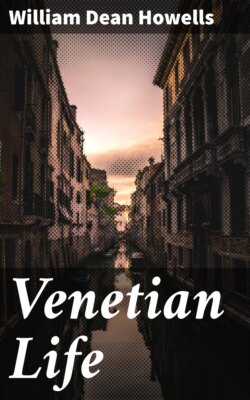Читать книгу Venetian Life - William Dean Howells - Страница 8
Оглавление“Took the soul
Of that waste place with joy;”
and ever, when this organist came to a certain lively waltz, and threw his whole soul, as it were, into the crank of his instrument, my beloved ragamuffin failed not to seize another cake-boy in his arms, and thus embraced, to whirl through a wild inspiration of figures, in which there was something grotesquely rhythmic, something of indescribable barbaric magnificence, spiritualized into a grace of movement superior to the energy of the North and the extravagant fervor of the East. It was coffee and not wine that I drank, but I fable all the same that I saw reflected in this superb and artistic superation of the difficulties of dancing in that unfriendly foot-gear, something of the same genius that combated and vanquished the elements, to build its home upon sea-washed sands in marble structures of airy and stately splendor, and gave to architecture new glories full of eternal surprise.
So, I say, I grew early into sympathy and friendship with Venice, and being newly from a land where every thing, morally and materially, was in good repair, I rioted sentimentally on the picturesque ruin, the pleasant discomfort and hopelessness of every thing about me here. It was not yet the season to behold all the delight of the lazy, out-door life of the place; but nevertheless I could not help seeing that great part of the people, both rich and poor, seemed to have nothing to do, and that nobody seemed to be driven by any inward or outward impulse. When, however, I ceased (as I must in time) to be merely a spectator of this idleness, and learned that I too must assume my share of the common indolence, I found it a grievous burden. Old habits of work, old habits of hope, made my endless leisure irksome to me, and almost intolerable when I ascertained fairly and finally that in my desire to fulfill long-cherished, but, after all, merely general designs of literary study, I had forsaken wholesome struggle in the currents where I felt the motion of the age, only to drift into a lifeless eddy of the world, remote from incentive and sensation.
For such is Venice, and the will must be strong and the faith indomitable in him who can long retain, amid the influences of her stagnant quiet, a practical belief in God’s purpose of a great moving, anxious, toiling, aspiring world outside. When you have yielded, as after a while I yielded, to these influences, a gentle incredulity possesses you, and if you consent that such a thing is as earnest and useful life, you cannot help wondering why it need be. The charm of the place sweetens your temper, but corrupts you; and I found it a sad condition of my perception of the beauty of Venice and friendship with it, that I came in some unconscious way to regard her fate as my own; and when I began to write the sketches which go to form this book, it was as hard to speak of any ugliness in her, or of the doom written against her in the hieroglyphic seams and fissures of her crumbling masonry, as if the fault and penalty were mine. I do not so greatly blame, therefore, the writers who have committed so many sins of omission concerning her, and made her all light, color, canals, and palaces. One’s conscience, more or less uncomfortably vigilant elsewhere, drowses here, and it is difficult to remember that fact is more virtuous than fiction. In other years, when there was life in the city, and this sad ebb of prosperity was full tide in her canals, there might have been some incentive to keep one’s thoughts and words from lapsing into habits of luxurious dishonesty, some reason for telling the whole hard truth of things, some policy to serve, some end to gain. But now, what matter?
